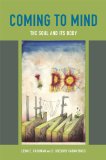February 10, 2014

The Mirror of the World: Subjects, Consciousness, and Self-Consciousness by Christopher Peacocke (Oxford University Press, 2014)
(Hardcover at Amazon – 4/27/14), (amazon.co.uk), (UK kindle ed.)
Book description from the publisher:
Christopher Peacocke presents a philosophical theory of subjects of consciousness, together with a theory of the nature of first person representation of such a subject of consciousness. He develops a new treatment of subjects, distinct from previous theories, under which subjects were regarded either as constructs from mental events, or fundamentally embodied, or Cartesian egos. In contrast, his theory of the first person integrates with the positive treatment of subjects–and it contributes to the explanation of various distinctive first person phenomena in the theory of thought and knowledge. These are issues on which contributions have been made by some of the greatest philosophers, and Peacocke brings his points to bear on the contributions to these issues made by Hume, Kant, Frege, Wittgenstein, and Strawson. He also relates his position to the recent literature in the philosophy of mind, and then goes on to distinguish and characterize three varieties of self-consciousness. Perspectival self-consciousness involves the subject’s capacity to appreciate that she is of the same kind as things given in a third personal way, and attributes the subject to a certain kind of objective thought about herself. Reflective self-consciousness involves awareness of the subject’s own mental states, reached in a distinctive way. Interpersonal self-consciousness is awareness that one features, as a subject, in some other person’s mental states. These varieties, and the relations and the forms of co-operation between them, are important in explaining features of our knowledge, our social relations, and our emotional lives. The theses of The Mirror of the World are of importance not only for philosophy, but also for psychology, the arts, and anywhere else that the self and self-representation loom large.
Google Books preview:
See also: Author’s Facebook page
Comments (1)
- consciousness,new books,philosophy of mind,self
January 30, 2014

Consciousness and the Brain: Deciphering How the Brain Codes Our Thoughts by Stanislas Dehaene (Viking, 2014)
(kindle ed.), (amazon.co.uk)
Book description from the publisher:
A breathtaking look at the new science that can track consciousness deep in the brain
How does our brain generate a conscious thought? And why does so much of our knowledge remain unconscious? Thanks to clever psychological and brain-imaging experiments, scientists are closer to cracking this mystery than ever before.
In this lively book, Stanislas Dehaene describes the pioneering work his lab and the labs of other cognitive neuroscientists worldwide have accomplished in defining, testing, and explaining the brain events behind a conscious state. We can now pin down the neurons that fire when a person reports becoming aware of a piece of information and understand the crucial role unconscious computations play in how we make decisions. The emerging theory enables a test of consciousness in animals, babies, and those with severe brain injuries.
A joyous exploration of the mind and its thrilling complexities, Consciousness and the Brain will excite anyone interested
in cutting-edge science and technology and the vast philosophical, personal, and ethical implications of finally quantifying
consciousness.
Google Books preview:
Comments (1)
- cognitive science,consciousness,new books
January 22, 2014

Languages of Intentionality: A Dialogue Between Two Traditions on Consciousness (Continuum Studies in Philosophy) by Paul S. MacDonald (Bloomsbury Academic, 2014)
(amazon.co.uk)
Book description from the publisher:
Intentionality – the relationship between conscious states and their objects – is one of the most discussed topics in contemporary debates in philosophy of mind, cognitive neuroscience and the study of consciousness. Long a foundational concept in Phenomenology, it has also received considerable coverage in the writings of analytic philosophers. This book is the first study to offer an impartial, well-informed assessment of the two traditions’ approaches through an in-depth investigation of the principal thinkers’ ideas, so that their positions emerge side-by-side, converging and diverging on certain shared themes.
Beginning with a historical discussion of the development of the term in the work of Continental thinkers in the 19th and early 20th centuries, the book considers the work of Brentano and Husserl and subsequent existentialist critiques. From there, it explores how empirical-analytic philosophers took up the topic, drawn as they were to materialist and computer models of the mind. Finally MacDonald presents a new ‘hybrid’ account of intentionality that will be a crucial work for scholars working on consciousness and the mind.
Comments (0)
- consciousness,new books,philosophy of mind
December 30, 2013

Coming to Mind: The Soul and Its Body by Lenn E. Goodman and D. Gregory Caramenico (University of Chicago Press, 2013)
Book description from the publisher:
How should we speak of bodies and souls? In Coming to Mind, Lenn E. Goodman and D. Gregory Caramenico pick their way through the minefields of materialist reductionism to present the soul not as the brain’s rival but as its partner. What acts, they argue, is what is real. The soul is not an ethereal wisp but a lively subject, emergent from the body but inadequately described in its terms.
Rooted in some of the richest philosophical and intellectual traditions of Western and Eastern philosophy, psychology, literature, and the arts and the latest findings of cognitive psychology and brain science—Coming to Mind is a subtle manifesto of a new humanism and an outstanding contribution to our understanding of the human person. Drawing on new and classical understandings of perception, consciousness, memory, agency, and creativity, Goodman and Caramenico frame a convincing argument for a dynamic and integrated self capable of language, thought, discovery, caring, and love.
Google Books preview:
Comments (0)
- consciousness,new books,philosophy of mind
December 28, 2013

The Spiritual Automaton: Spinoza’s Science of the Mind by Eugene Marshall (Oxford University Press, 2013)
(Hardcover – 2/15/14), (amazon.co.uk), (UK kindle ed.)
Book description from the publisher:
Eugene Marshall presents an original, systematic account of Spinoza’s philosophy of mind, in which the mind is presented as an affective mechanism, one that, when rational, behaves as a spiritual automaton. The central feature of the account is a novel concept of consciousness, one that identifies consciousness with affectivity, a property of an idea paradigmatically but not exhaustively instantiated by those modes of thought Spinoza calls affects. Inadequate and adequate ideas come to consciousness, and thus impact our well-being and establish or disturb our happiness, only insofar as they become affects and, thus, conscious. And ideas become affects by entering into appropriate causal relations with the other ideas that constitute a mind. Furthermore, the topic of consciousness in Spinoza provides an eminently well-placed point of entry into his system, because it flows directly out of his central metaphysical, epistemological, and psychological commitments–and it does so in a way that allows us to see Spinoza’s philosophy as a systematic whole. Further, doing so provides a thoroughly consistent yet novel way of thinking about central themes in his thought. Marshall’s reading provides a novel understanding of adequacy, innateness, power, activity and passivity, the affects, the conatus, bondage, freedom, the illusion of free will, akrasia, blessedness, salvation, and the eternity of the soul. In short, by explaining the affective mechanisms of consciousness in Spinoza, The Spiritual Automaton illuminates Spinoza’s systematic philosophical and ethical project as a whole, as well as in its details, in a striking new way.
Google Books preview:
Comments (0)
- consciousness,new books,philosophy of mind







